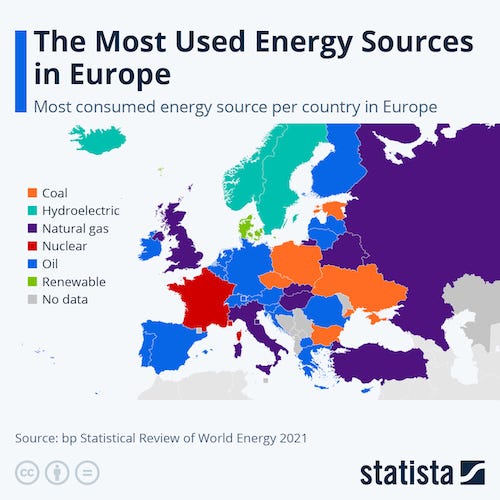Today’s posts that caught my eye:
Xi vows never to renounce use of force to 'reunify' with Taiwan.
Tories hold secret talks on crowning new leader: Liz Truss is battling for her political survival as leading business figures and Conservative MPs pile pressure on the UK prime minister to resign after a series of damaging U-turns that have shredded her credibility.
Uber Eats to deliver pot in Toronto.
Thank you for subscribing. Know someone who should check out the newsletter? Let them!
The World
Policy makers around the world see rising risks that the global economic slowdown could turn into a steeper slump due to strong inflation, high energy costs and climbing interest rates. Another bad U.S. inflation report last week is likely to keep the Federal Reserve lifting interest rates at a rapid clip. That could help spur the U.S. dollar higher, further elevating the cost of imports and debt service for many countries. Key energy producers are crimping supply, feeding price pressures and slowing economic activity, particularly in Europe. New data from China showed consumer spending falling sharply, another sign of cooling economic growth. “The worst is yet to come,” said International Monetary Fund Managing Director Kristalina Georgieva. (Wall Street Journal)
Planning for the chaotic post-Putin world: A Shakespearean knife-fight for power; unleashed regional leaders; a nuclear arsenal up for grabs — all are possible if Putin departs. (Politico)
Leaders of democracies increasingly echo Putin in authoritarian tilt: From Italy to Brazil to the United States, political leaders increasingly are echoing Russian President Vladimir Putin and one another by embracing far-right authoritarianism. (Washington Post)
‘Coffins Are Already Coming’: The Toll of Russia’s Chaotic Draft: A half-dozen Russian soldiers talk about being shipped to an area of intense fighting in eastern Ukraine just 11 days after their mobilization. Asked about his shooting practice, a bearded conscript says, “Once. Three magazines.” In a town near Yekaterinburg, in central Russia, newly mobilized men march in place in their street clothes. “No machine guns, nothing, no clothes, no shoes,” says an unidentified observer. “Half of them are hungover, old, at risk — the ambulance should be on duty.” Elsewhere, scores of relatives of freshly drafted Russian soldiers crowd outside a training center, passing items through its fence to the recruits — boots, berets, bulletproof vests, backpacks, sleeping bags, camping mats, medicine, bandages and food. “This is not how it’s done,” a woman named Elena told the news outlet Samara Online. “We buy everything.” (New York Times)
Xi Jinping steers towards confrontation with west in ‘great rejuvenation’ push: China’s president Xi Jinping has signalled his intention to steer the foreign policy of the world’s most populous country and rising military superpower away from reconciliation with the west as he warned of “grave international developments” not seen in the past 100 years. In a nearly two-hour speech opening the Chinese Communist party’s 20th national congress in Beijing on Sunday, Xi touted his administration’s success in countering foreign interference and safeguarding China’s “dignity” and “core interests”. Xi also issued thinly veiled criticism of the US and its allies, boasting that China under his leadership had taken a “clear-cut stance” against hegemonism and stood unwavering in the face of “bullying”. China’s most powerful leader since Mao Zedong reiterated his commitment to taking control of Taiwan, potentially by military force. (Financial Times)
Chinese military must move faster to become world-class fighting force, Xi Jinping tells party congress. Xi’s work report to 20th party congress cites need to ‘win regional wars’, though speech at Great Hall of the People makes no mention of it. Return of phrase is welcome sign that the PLA will focus on smaller-scale warfare, observer says. (South China Morning Post)
Xi vows never to renounce use of force to 'reunify' with Taiwan. (Nikkei Asia Review)
Tories hold secret talks on crowning new leader: Liz Truss is battling for her political survival as leading business figures and Conservative MPs pile pressure on the UK prime minister to resign after a series of damaging U-turns that have shredded her credibility. Truss’s decision to appoint Jeremy Hunt as chancellor and scrap key parts of her economic platform have failed to reassure markets and the City, critics said. But her allies lashed out at those trying to remove her, warning that “plotters” were forcing the Tories towards a general election. Downing Street was braced for further market turbulence on Monday, after Friday’s sell-off when investors warned that Truss’s attempt to reassure them by scrapping an £18bn corporate tax cut was not enough. (The Times, Financial Times)
More Asean countries expected to give Russia cold shoulder as war drags on: Majority support of Asean in the UN vote reflects Moscow’s waning influence on the bloc, analysts say, but Asean is likely to retain ‘pragmatic’ approach with Russia. (South China Morning Post)
Energy crisis squeezes big science: CERN, Europe’s particle-physics laboratory, is responding to requests by a French energy suppliers to decrease demands on itsthe network. The facility is one of the largest electricity consumers in France. CERN will bring forward the lab’s annual year-end technical stop this year by two weeks and reduce operations by 20% in 2023. The German Electron Synchrotron is also hunkering down to weather rising energy prices. Next week, the lab will run tests to see how operating instruments at lower power settings would affect experiments. (Nature)
Studies suggest that COVID-19 vaccines are extremely safe for kids and are good at preventing severe disease. But in countries where vaccines are available, take-up in children has varied widely. Close to 90% of those aged 3–17 are fully immunized in Chile, compared with 28% of kids aged 5–11 in New Zealand and 3% of the same age group in the Netherlands. (Nature)
Documents show top DeSantis officials were personally involved in Martha's Vineyard flights: On Sept. 5, more than a week before the first flight, Larry Keefe texted James Uthmeier that he was “back out here” and the chief of staff responded that he endorsed the effort. (Politico)
Conservative Muslims join forces with Christian right on Michigan book bans: ‘This has nothing to do with Trump,’ a parent says, as people pressure officials to censor books with LGBTQ+ themes. (The Guardian)
Thousands evacuated in Washington state as 66 large fires burn in U.S. (Axios)
Australians take stock of flood damage amid warnings of more rain: Major flood warnings are in place across many regions despite little rainfall over the weekend with many swollen rivers only expected to reach peak flood levels this week. (Reuters)

Economy
Goldman Plans Sweeping Reorganization, Combining Investment Banking and Trading: Goldman will combine its flagship investment-banking and trading businesses into one unit, while merging asset and wealth management into another, people familiar with the matter said. Marcus, Goldman’s consumer-banking arm, will be part of the asset- and wealth-management unit, the people said. A third division will house transaction banking, the bank’s portfolio of financial-technology platforms, specialty lender GreenSky, and its ventures with Apple Inc. and General Motors Co., the people said. The reorganization could be announced within days, the people said. Goldman is scheduled to report third-quarter earnings Tuesday. (Wall Street Journal)
Brussels to propose temporary gas price ceiling to curb extreme prices: Draft emergency mechanism would allow EU to step in as part of effort to control energy crisis. (Financial Times)
Foreign workers shun Japan as yen's value plunges: Average wage in dollar terms falls 40% over 10 years. (Nikkei Asia Review)
Britain will be in recession until next summer, according to an influential forecaster, as Whitehall officials battle to restore the UK’s credibility in global markets after weeks of turmoil. The EY Item Club now expects gross domestic product to contract by 0.3 per cent next year, down from a previous estimate of 1 per cent growth, although the risk of a severe downturn has been mitigated by the government’s intervention on energy bills. (The Times)
Britain’s largest international law firms are struggling to attract and retain staff in the US after the crash in the value of sterling compounded their lack of competitiveness in the world’s most profitable legal market. At least one major hire in New York fell apart in recent weeks as the British pound slumped by almost a fifth against the US dollar. The group of “magic circle” law firms that work on the City of London’s biggest deals have historically struggled to match their American competitors on pay due to lower overall profitability and more restrictive remuneration models that prevented outsized salaries for star partners. (Financial Times)
Technology
US-China tech rivalry puts home-grown innovation ‘at the heart’ of modernisation drive, Xi Jinping vows. ‘Talent is the foremost resource’, and bolstering China’s pool of professionals will be more heavily prioritised in the coming years, according to Xi Jinping’s report to party cadres. Technological self-sufficiency and ‘winning the talent war’ are deemed critical steps toward gaining an upper hand as competition with US shows no sign of abating. (South China Morning Post)
Apple has put on hold plans to use memory chips from China's Yangtze Memory Technologies Co. (YMTC) in its products. The move comes amid the latest round of U.S. export controls imposed against the Chinese tech sector and is a sign that Washington's crackdown is creating a chilling effect down the supply chain. (Nikkei Asia Review)
US Chip Sanctions ‘Kneecap’ China’s Tech Industry: The sweeping new controls are designed to keep the country’s AI industry stuck in the dark ages while the US and other Western countries advance. The restrictions also block the export of chipmaking equipment and design software, and ban the world’s leading silicon fabs, including Taiwan’s TSMC and South Korea’s Samsung, from manufacturing advanced chips for Chinese companies. “The United States is saying to China, ‘AI technology is the future; we and our allies are going there—and you can’t come,’” says Gregory Allen, director of the AI governance project at the Center for Strategic & International Studies (CSIS), a think tank in Washington, DC. Chris Miller, a professor at Tufts University and author of the recent book Chip War: The Fight for the World's Most Critical Technology, says the new export blockade is unlike anything seen since the Cold War. “The logic is throwing sand in the gears,” Miller says. (Wired)
Meta is desperately trying to make the metaverse happen: Mark Zuckerberg wants us to live, work and breathe all things metaverse. Consumers aren’t convinced. (MIT Technology Review)
Current 5G is unlikely to interfere with planes: A new study has allayed some of the fear around 5G cell towers operating in airports’ vicinities. (Bloomberg)
TikTok Parent Sets Sights on Spotify With Expanded Music Service: ByteDance has begun talks with music labels about expanding its Resso streaming service globally to compete with industry leaders. The company wants the service to eventually be integrated with TikTok. (Wall Street Journal)
Google’s new AI can hear a snippet of a song—and then keep on playing. The technique, called AudioLM, generates naturalistic sounds without the need for human annotation. (MIT Technology Review)
Smart Links
Uber Eats to deliver pot in Toronto. (Axios)
British crown blocks Bermuda’s cannabis bill, straining ties. (Washington Post)
Expect cancer vaccine by 2030, say Covid pioneers: Couple behind BioNTech jab believe breakthrough is in our grasp. (The Times)
Impossible Foods has a big new offering in the works: filet mignon. (MIT Technology Review)
Alaska cancels snow crab season over population decline. (The Guardian)
Japan hopes foreign tourist surge will offer upside to weak yen. (Financial Times)
The Most Used Energy Sources in Europe. (Statista)
Good News
A blind woman just piloted an airplane across the country: ‘This is just such a huge moment, not just for me and my family, but the entire visually impaired community,’ Kaiya Armstrong said. (Washington Post)
In New York City, five hundred neighbors came together to share a meal on a busy street. There were no cars. No fights. Nobody complaining. Just neighbors being kind and neighborly. It's called "The Longest Table." (Goodable)

Thank you for subscribing to my newsletter. Know someone you think would like it?




